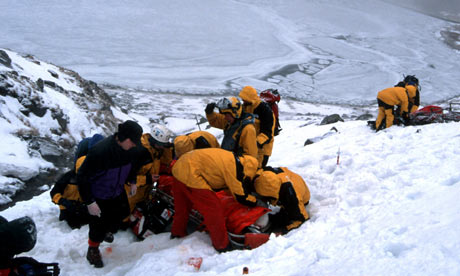
Britain's mountains have been busier than usual this autumn. The continuing recession and some decent weather has been drawing the crowds. Why go abroad, when it's far cheaper to nip up to Wales or the Lake District? But that increase means some mountain rescue teams in England and Wales are twice as busy this year as they were in 2008. The strain is tremendous. No one is talking full-blown crisis yet. But it's heading that way.
The Ogwen Valley Mountain Rescue Organisation in Snowdonia was particularly stressed last weekend, facing three incidents inside an hour on Sunday. The team has responded 115 times this year, with a month to go, up on 65 for the whole of 2008. Not all teams across England and Wales have faced that scale of increase, but the pattern is clear: more people than ever need rescuing.
The question is, why? The media like to blame mobile phones, and there's no question that they have a part to play. But mountain rescuers are more cautious. Mobile phones can cause problems, but they also save lives and save a lot of time looking for stranded victims. As usual, it's more a question of who is using the technology, not that it exists.
There are also warnings that people are going out into the hills unprepared or insufficiently experienced. This does happen, most usually on "celebrity" mountains, hills familiar to those members of the public with little specialist knowledge about weather, or navigation on difficult terrain. One rescuer told me of a stranded party who asked why the Welsh mountain path they were on wasn't lit at night. Advising those who are badly prepared is difficult, because they're outside the areas where people pick up knowledge.
And it's knowledge that's the key to what is fast becoming a serious problem. Most regular climbers and hill walkers are better equipped and prepared than they have ever been. Outdoor leader training in Britain is first class. The number of fatalities has remained more or less static around the country for decades. Walking and climbing are actually getting safer. It's the mushrooming numbers of tourists in the hills that is causing concern.
That surge is in many ways a good thing. It reconnects more of us to nature and gets us fitter. It boosts local economies. But mountain rescue teams are picking up the cost when things go wrong. Many people don't know that they are a purely volunteer force with regular jobs, turning out in the middle of the night in hostile weather. They do it because they believe that those who get lost or injured in the hills should be looked after by their own, not the taxpayer.
But the rapid increase in numbers is undermining the foundations of a British volunteer success stories. If mountain rescue teams can't recruit volunteers because the commitment is too great, then a valuable emergency service will be undermined. The spirit of self-reliance that British hill walkers cherish needs reaffirming. Mountains are wild places and should be left free from signs and restrictions.
The government, however, could nudge things along. Few hill lovers want to see a professional rescue service. Rescuers don't want the bureaucracy professional emergency services face. But a few low-cost interventions now could help preserve an extraordinary free service. One is to remove VAT on equipment and specialist clothing for mountain rescue teams. The other is to fund an information campaign to advise the general public on the dangers they may face on Britain's mountains. And if you're near a mountain rescue collection box on a walking holiday, put a couple of quid in it.

